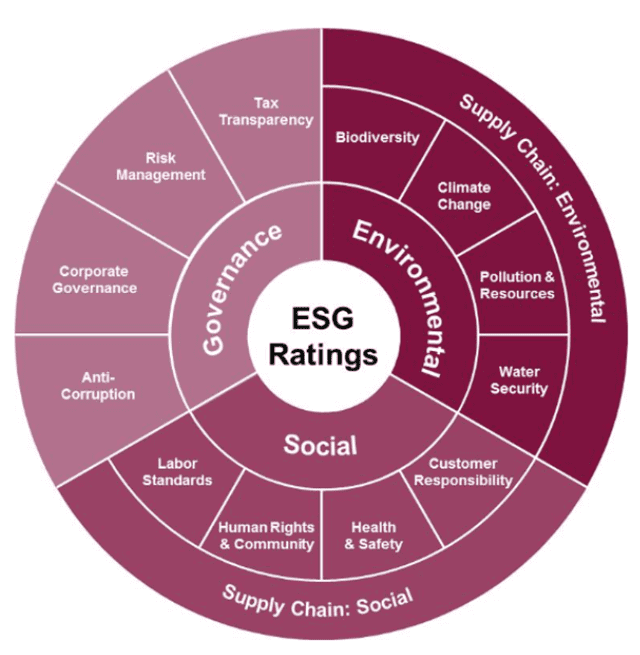These days, companies are judged on more than just how much money they make. How well a company handles environmental, social, and governance (ESG) issues shows how responsible and sustainable it is. One of the most trusted ways to measure this is the MSCI ESG rating. But how does it affect a company’s reputation and the trust investors place in it?
Read on to know.
Understanding MSCI ESG Ratings
This type of rating includes a comprehensive assessment of a company’s performance across the main ESG factors. These factors that lie within the assessments are:
- Environmental impact
- Labour and human rights practices
- Governance standards
- Ethical business conduct
It does the task of a report card for corporate responsibility. In school, a high grade in school displays a student’s competence and diligence. In the market, a strong MSCI ESG rating communicates to the stakeholders that a company is committed to responsibility and transparency. It also draws their attention towards its ethical business practices. The ratings serve ultimately as a reflection of how well a company is managing long-term risks and opportunities related to ESG.
In the eyes of investors, high MSCI ESG rating companies often earn a reputation of forward-thinking and resilient. It shows that they use a proactive approach to challenges. Climate change and workforce welfare are among those challenges. Also, corporate ethics and supply chain sustainability fall in the category of these hurdles. On the other hand, low ratings can serve as a red flag, signalling potential vulnerabilities to investors and the public alike.
Boosting Corporate Reputation
A company’s public image earns a good place with strong MSCI ESG ratings. Consumers and stakeholders would prefer brands that are responsible and ethical. ESG ratings design corporate reputation in the following ways:
Enhanced Public Image
Companies with high MSCI ESG ratings often appear as leaders in sustainability. The best part is that their commitment to reducing environmental impact and introducing fair labour practices is measurable. Their practices of maintaining ethical governance are visible and measurable, too. Such transparency builds trust and strengthens brand perception. Thus, such traits are invaluable in competitive markets.
Attracting Talent
Millennials and Gen-Z workers who prioritise purpose-driven careers, find these high MSCI ESG ratings of a company more attractive. They prefer such highly rated companies over other competitors. So, the companies with high ESG scores do care about employee well-being. They are able to attract and retain top talent with ease, comparatively.
Risk Mitigation and Reliability
When a company has proper ESG practices in place, it sees fewer controversies and disputes. This often saves the company from huge operational disruptions. High MSCI ESG ratings signal stability and effective risk management. The company thus appears forward-thinking to customers, partners, and the public. They see that the company is well-prepared for future challenges.
Strengthening Investor Confidence
While corporate reputation matters, investors rely heavily on data-driven insights. Here’s why the MSCI ESG rating plays a crucial role in shaping investor confidence:
Assessing Risk Profiles
The potential risks are easy to gauge through the MSCI ESG ratings of a company. Investors use them to do the same. High ratings advocate that a company can manage financial and operational risks associated with ESG factors in better ways. A strong score says a lot about the preparedness and resilience of the company. Hence, it looks like a safer investment.
Driving Financial Performance
On a factual basis, companies that have a high MSCI ESG rating tend to outperform their peers financially most of the time. Strong ESG practices correlate with:
- Stable revenues
- Better profitability
- Efficient resource management
Investors can recognise this link between sustainability and financial health. So, a high-rated company stands out as more attractive for a lender’s long-term investments.
Aligning with Investor Values
More and more investors are adding ESG considerations to their portfolios. They are doing this to find companies that align with responsible business practices. So, if a company shows a high MSCI ESG rating upfront, they assume that the company shares these values. Therefore, high ratings increase investor trust and encourage investment from sustainability-focused funds.
Navigating Regulatory and Market Expectations
Worldwide, the ESG disclosure regulations are tightening. Companies with high MSCI ESG ratings have a better position. They appear to meet these ESG requirements. Transparency, reporting, and compliance appear through strong ESG scores. Investors gain confidence in that particular company. Such companies stand out as proactive and accountable options.
The Ripple Effect of ESG Excellence
Know the effect of a strong MSCI ESG rating across the company’s entire range.
- Supplier Engagement: Such reputable companies often require suppliers to stick to sustainability standards. This will, in return, improve overall supply chain practices and reduce risk. Additionally, it will reinforce the company’s commitment to responsible business.
- Customer Loyalty: Ethical and responsible practices resonate with consumers. Such brands with higher ESG scores can find unique places for themselves in crowded markets. This enhances customer trust and loyalty for them.
- Operational Efficiency: Good ESG will ease resource management and energy efficiency. There is better waste reduction in operation, too. Such operational improvements bring about improvement in margins and stronger investor confidence than before.
Achieving a Strong MSCI ESG Rating
A high MSCI ESG rating is just for once. The truth is that it requires a constant trail of efforts to stay committed to sustainability and governance. Companies should focus on:
- Clear Policies and Documentation: If a company has proper documentation, it will have accountability and support higher ratings. So, a company will have to:
- Formalise ESG policies
- Update them regularly
- Link them to measurable goals.
- Global Standards Alignment: When a company meets internationally recognised benchmarks, it shows its credibility. Align ESG initiatives with frameworks such as GRI, SASB, and ISO 26000.
- Monitoring and Continuous Improvement: Continuous improvement is very important to achieving high ESG scores.
- Conduct regular audits
- Track KPIs
- Address gaps promptly
- Cross-Functional Collaboration: A unified approach is a must for consistency. Embed ESG practices across departments including HR, compliance, operations, and procurement.
- Transparent Reporting: Third-party audits and certifications add credibility and demonstrate commitment. Collect accurate ESG data and report results clearly.
Conclusion
The MSCI ESG rating has become a cornerstone in today’s corporate world. It provides measurable insights into how well a company manages environmental, social, and governance factors. High ratings enhance corporate reputation, attract top talent, mitigate risks, and, importantly, instil investor confidence.
In an era where transparency and accountability are paramount, companies that prioritise ESG performance gain a competitive advantage. Strong MSCI ESG ratings signal to the market that a company is responsible, resilient, and ready for long-term growth. Investors, employees, customers, and regulators all take notice, and that attention translates into trust, loyalty, and opportunity.
So, companies that embrace ESG excellence are positioning themselves for lasting success.





























